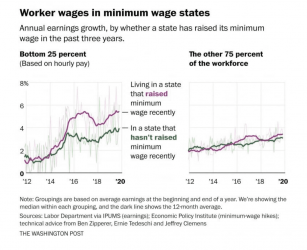colfax_m
Diamond Member
- Nov 18, 2019
- 38,988
- 14,843
Great. And do you have any of that info?How does one tell if wages are going up because of Trump or going up as expected from a tightening labor market or for any other reason (such as increases in minimum wage)? Wages were increasing prior to Trump coming into office, were they not? Giving credit is not so easy.
Well, there is the historical fact that those "expectations" have not been met, for many years, prior to now.
Have you ever looked into the wage stagnation issue before?
Are you sure about that? What measure should we use to look at historical wage growth?
Historical wage growth adjusted for inflation and compared to how it tracks with increases in productivity, or eventually fails to.
Especially broken down by income categories, instead of an average, which can hide important information.
Wage Stagnation in Nine Charts

A bit more up to date, it seems that real hourly wage growth was actually was better under Obama.
Hmm

